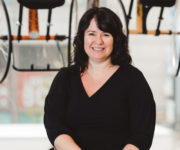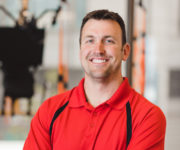Meet the Match
A Namibian Sports Leader Bridges the Inclusion Gap
For many years, Michael Hamukwaya was a man without a country.
With his Namibian parents living in exile, Michael was born in a refugee camp in Zambia in 1977 when his home country was still under South African apartheid rule. As a child, he was moved to another camp in Angola, where he lived until 1986.
When he was 9 years old, Michael was given a scholarship to study in Cuba. It was a drastic change: “It was like leaving the jungle and going to a civilized country for the first time,” he says.
After completing primary school, Michael attended a sports-focused secondary school, where he learned boxing, basketball, table tennis, and gymnastics. By the time he finally arrived in Namibia in 1993, he spoke only Spanish and his interactions with other Namibians had been limited to his fellow students in Cuba. It was sport that eased his transition.
“With my sports experience, it was easier to get more involved with kids in school,” Michael says. “That helped me make more friends and learn about Namibian culture. That’s how I learned Afrikaans and Oshiwambo.”
After graduation, Michael attended the Namibian Institute of Mining and Technology and was later certified by the Ministry of Health and Social Services as an orthopedic technician (he is currently completing a bachelor’s degree in education from the University of Namibia).
In 2003, Michael began work in a hospital in northern Namibia, where he met young men going through rehabilitation. He noticed they spent most of their days in the same positions on their hospital beds. Even though he hadn’t considered sports before, he imagined that physical activity would benefit them, so he reached out to the local sports club, Oshana Sports Heroes, to learn more about sports for people with disabilities.
“I joined the club with no experience as a sports coach,” Michael recalls. “Soon, I was coaching track and field, then wheelchair basketball. I was taking what I learned from the non-disabled side in Cuba and applying it. And I started seeing the courage and motivation from the guys that motivated me to keep pushing.”
In 2003, Namibia launched its National Paralympic Committee (NPC). During this period, Michael worked with other national federations to improve his athletics coaching and train athletes for tournaments. After the International Paralympic Committee (IPC) recognized Namibia’s NPC, it sent him and a few other coaches to Egypt to participate in training for two months. There, he learned more about coaching athletics, boccia, goalball, powerlifting, and sitting volleyball.
“The course opened my eyes to see this movement was very big,” says Michael, who now serves as secretary general of the NPC. “I brought the videos back home and showed the patients at my hospital. They invited their neighbors to come watch, and word spread about our sports club. We kept growing and the IPC kept helping Namibia, and we’ve been building since then.”
According to Michael’s estimates, the number of elite athletes with disabilities has grown from seven in the early days to 21 athletes. At the Rio Paralympics, the country traveled with a delegation of 10 athletes and left with five Paralympic medals in athletics—one gold, two silvers, two bronzes.
Outside of developing competitive Paralympic athletes, Michael sees other key benefits for sports in the lives of Namibians with disabilities—a population consisting of approximately 100,000 people, based on numbers from the 2011 Census. In his almost 15 years as an orthopedic tech, he has seen significant improvements in his patients’ physical health. He has also seen sport have a direct impact on employment and financial empowerment, as athletes win medals and receive stipends from the government and job offers from the corporate world.
Despite progress, major challenges persist for Namibians with disabilities. While the Namibian government ratified the UN Convention on the Rights of Persons with Disabilities in 2007, implementation of inclusion principles and equal opportunity for people with disabilities is still lacking. The country has inadequate and inaccessible facilities, creating a cycle where the disabled are less likely to finish secondary school and thus acquire jobs or access privileges such as sports clubs.
Michael, however, is optimistic that sports can address some of these challenges. In addition to his full-time job and role in the NPC, he runs his own club, Namib Lion Athletics Club, where he trains 62 athletes, including 27 with a range of disabilities. He also co-founded a foundation, Sports on the Move, with Rio 2016 gold medalist Ananais Shikongo. Through this foundation, they are supporting elite athletes with no access to basic equipment, training and nutrition.
“My passion is so big right now,” Michael says. “I’m trying to bridge the gap of inclusion. We want a bigger voice for people with disabilities.”
During his time on the U.S. Department of State Global Sports Mentoring Program, Michael was hosted by Shirley Ryan from AbilityLab, where he worked to expand his impact in Namibia with the support of mentors Stephanie Kanter and Derek Daniels. As he looked to expand his skills in strategic planning and implementation, marketing and corporate sponsorships, and advocacy, Michael provided a unique Namibian perspective on the connection between rehabilitation and Paralympic sports. Stephanie and Derek, who have two decades of cumulative experience in rehab and both grassroots and high-level adaptive sports at AbilityLab (formerly Rehabilitation Institute of Chicago), were there to guide him on the journey toward a brighter future for people with disabilities in Namibia.


